Answer these simple questions and we will find you the BEST prices
Which type of solar quotes do you need?
It only takes 30 seconds
100% free with no obligation

Get up to 3 quotes by filling in only 1 quick form

Compare quotes and find yourself the best deal

Increase the value of your home by installing a new boiler
- Householdquotes.co.uk
- Boilers
- Boiler Comparison
Boiler Comparison: Costs and Quotes in the UK (2025)

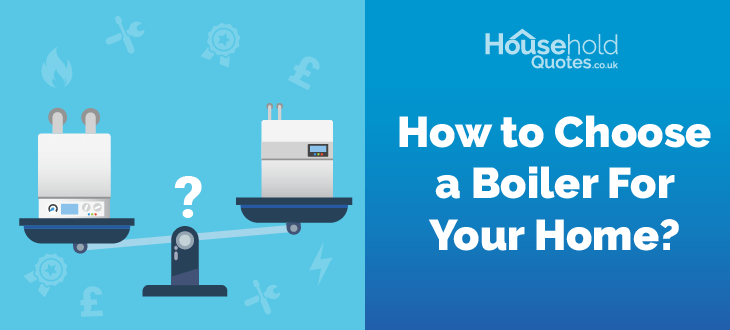
- To find your perfect boiler, compare its efficiency, fuel type, size, and heating capacity for your home, installation and space requirements and, of course, its cost.
- The most common boiler type is the combi boiler, which provides hot water on demand without a separate tank. This makes it compact and suitable for small properties.
- Replacing an old boiler with a new, efficient model can reduce your energy bills by up to £475, enhance safety by preventing carbon monoxide leaks, and ensure quieter operation.
Is running a boiler comparison turning your brain into mush? You're definitely not alone. Boiler comparisons can feel like cracking a secret code.
Boiler types, efficiency ratings, fuel types; trying to compare gas boilers, compare combi boilers, compare new boiler prices…It's enough to make you want to crawl back under the covers, hoping some magic sorting hat picks one for you.
In this guide, we'll try to make it easier for you to compare boilers. We'll break down the different types and compare new boiler prices in the UK for the most efficient boilers on the market.
Also, we can help you with the new boiler quote comparison. Searching for quotes on your own can turn into a nightmare that never ends. You can spend weeks calling installers before you get any results.
Why not use our service to receive up to 3 boiler quotes quickly and easily? Simply fill in our 30-second form, and we'll connect you with experienced boiler specialists near you. Our quotes are free and non-binding. Click below to begin.
- Quotes from local installers
- Payment by finance available
- Save up to £975
It only takes 30 seconds

Compare boilers: Different system types
First, let's compare boiler options based on three available types.
Combi boiler
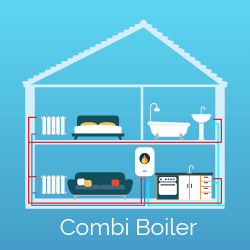
Combi boilers heat water directly on demand, eliminating the need for a bulky hot water storage tank. Cold water enters the unit, gets heated by a gas burner or electric element, and then travels straight to your taps and central heating.
This compact design makes them the best boilers for smaller homes with limited space. Installation is also simpler compared to other systems. Plus, you get the convenience of instant hot water, eliminating the need to wait for a tank to refill.
However, while doing your combi boiler comparison, keep in mind their limitations. The biggest concern is hot water flow. They might struggle to meet high demand in larger households with multiple bathrooms or frequent hot water use.
Additionally, combi boilers can be sensitive to fluctuating water pressure, leading to inconsistent hot water flow. Finally, they tend to have a shorter lifespan compared to other options. So, when you compare combi boilers, choose the most efficient ones.
System boiler
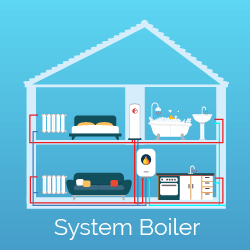
System boilers offer a happy medium between efficiency and hot water availability. They work similarly to combi boilers by heating water on demand. But instead of directly feeding the taps, the hot water is stored in a separate hot water cylinder. This ensures a consistent flow of hot water, even when multiple taps are running simultaneously.
System boilers are perfect for larger homes with multiple bathrooms or frequent hot water use. They deliver a steady flow of hot water regardless of demand and generally last longer than combi boilers due to less wear and tear on the boiler itself.
However, system boilers require more space to accommodate the dedicated hot water cylinder. Additionally, the extra component adds to the overall installation cost compared to a combi boiler.
Conventional boiler
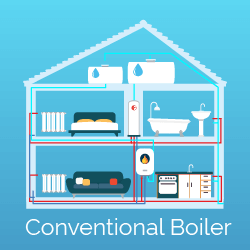
This is the classic boiler setup often found in older homes. Similar to a system boiler, it uses a separate hot water cylinder for storage, but it also requires a cold water storage tank typically located in the loft.
The boiler heats water, which is then stored in the cylinder. Cold water from the loft tank feeds into the cylinder, ensuring a constant supply of refillable hot water. This traditional setup offers reliable hot water flow, even with high demand. Also, it can potentially be a more budget-friendly option compared to system boilers, especially for replacements in existing setups with tanks already present.
However, conventional boilers have drawbacks. Unlike combi boilers, they require a separate hot water cylinder, a cold water tank, and venting systems (flues). Installing a new flue or modifying an existing one can be a complex process, especially if the layout of your home has changed since the original boiler was installed.
Depending on the configuration of your current system, connecting a new conventional boiler to existing pipework might require adjustments or rerouting pipes. However, installing a new conventional boiler in a home that might not have had one previously requires additional work to accommodate the venting system and potentially reroute pipes to connect with the new boiler.
If you're wondering which boiler type is best for your situation, it’s best to decide together with an experienced boiler installer.
Simply click the button below and complete our brief 30-second form. We'll promptly connect you with up to 3 vetted installers, ensuring a seamless transition to an efficient boiler solution.
- Quotes from local installers
- Payment by finance available
- Save up to £975
It only takes 30 seconds

Compare boilers: Different fuel types
#1 Gas
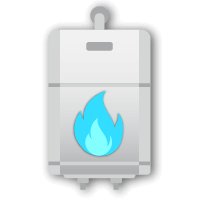
Natural gas is the most popular fuel for boilers in the UK, used by combi, traditional, and system boilers. It is a clean-burning and efficient fuel that produces fewer carbon emissions than coal or oil.
23 million UK households use gas boilers for heating, which is around 85% of homes in the country.
Gas boiler efficiency mainly depends on age, type, and design. Upgrading to a high-efficiency gas boiler can reduce homeowners' energy bills by up to £475 and their carbon footprint.
When you compare gas boilers, keep in mind that while natural gas is cleaner than other fossil fuels like coal, it still contributes to greenhouse gas emissions and climate change.
Thus, the UK government has set ambitious targets to achieve net-zero emissions by 2050, which includes phasing out the installation of new gas boilers. The timeline for this transition is currently being debated, with initial plans to ban the sale of new gas boilers by 2025 potentially being extended to 2035 or even cancelled completely.
Transitioning away from gas boilers is a significant challenge, as it requires retrofitting millions of existing homes with low-carbon heating alternatives, such as heat pumps or hydrogen-ready boilers. The government has announced a £450 million Boiler Upgrade Scheme to grant up to £7,500 to households switching to low-carbon heating systems, like heat pumps.
| England, Scotland, Wales | Northern Ireland | |
|---|---|---|
| Fuel costs (p/kWh) | 6.0 | 12.07 |
| Standing charge (£/year) | 106.26 | - |
| Carbon dioxide equivalent factor (kgCO2e/kWh) | 0.213 | 0.213 |
#2 LPG
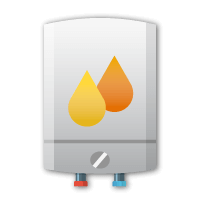
LPG (liquid petroleum gas), which includes propane and butane, is another fuel option during the boiler comparison. It is especially suitable in areas not connected to the natural gas grid.
LPG has a higher energy content at 93.2 MJ/m³ than natural gas (around 39MJ/m³). This means that less LPG is required to produce the same amount of heat, making it more efficient as a fuel source.
Due to its higher energy density, LPG can be a more cost-effective alternative to natural gas in certain situations despite potentially higher upfront costs for storage and delivery.
Also, when burned, LPG produces less CO2 than natural gas. It emits 15% less CO2 than kerosene, 29% less than gas oil, and 25% less than heavy fuel oil.
However, unlike natural gas, which is delivered through pipelines, LPG must be stored in pressurised tanks and delivered periodically, which is less convenient. Also, the storage and delivery costs can add to the overall expense.
| England, Scotland, Wales | Northern Ireland | |
|---|---|---|
| Fuel costs (p/kWh) | 8.1 | 11.2 |
| Standing charge (£/year) | 71.00 | 63.00 |
| Carbon dioxide equivalent factor (kgCO2e/kWh) | 0.240 | 0.240 |
Avoid the hassle of spending hours on boiler comparison and calling up companies. We can easily bring you up to 3 free, non-binding quotes from installers we’ve personally vetted. Click the button below to get started.
- Quotes from local installers
- Payment by finance available
- Save up to £975
It only takes 30 seconds

#3 Oil
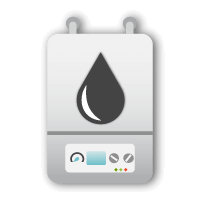
Oil boilers are a popular heating solution for homes in the UK that are not connected to the gas grid. About 4 million UK homes aren't on the gas grid, and it's estimated that about 2 million UK homes use oil-fired central heating boilers.
Oil boilers typically use kerosene as their primary fuel source, stored in an external storage tank on the property. They can be internal or external models, with external boilers being a popular choice where internal space is limited.
Some of the top oil boiler brands in the UK include Warmflow, Grant, Viessmann, and Worcester Bosch boilers.
However, there is an increasing demand for more sustainable options, and some oil boilers are now compatible with biofuels like HVO (hydrotreated vegetable oil), which have a lower carbon footprint.
| England, Scotland, Wales | Northern Ireland | |
|---|---|---|
| Fuel costs (p/kWh) | 7.1 | 7.28 |
| Standing charge (£/year) | - | - |
| Carbon dioxide equivalent factor (kgCO2e/kWh) | 0.298 | 0.298 |
#4 Electric
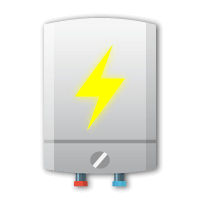
Electric boilers are an alternative heating solution that converts electricity into heat for your central heating system and hot water. While not as common as gas boilers in the UK, they are gaining traction due to the push for greener heating options.
Electric boilers can be considered truly emission-free and environmentally friendly throughout their lifecycle if the electricity is generated from renewable sources like solar, wind, or hydroelectric power. There are no combustion byproducts like carbon dioxide (CO2), nitrogen oxides (NOx), carbon monoxide (CO), or particulate matter since no fossil fuels are burnt.
However, if the electricity comes from fossil fuel-based power plants (coal, natural gas, etc.), then the electric boiler is simply shifting the emissions from the home to the power plant.
According to the Energy Saving Trust, electric boilers have an emission intensity of 0.225–0.234kg CO2 equivalent per kWh of energy consumed, slightly higher than 0.213kg for gas boilers in the UK.
| England, Scotland, Wales | Northern Ireland | |
|---|---|---|
| Fuel costs (p/kWh) | 22.36 | 36.3 |
| Fuel costs, off-peak Economy 7 tariff (p/kWh) | 14.4 | 19.83 |
| Standing charge (£/year) | 220 | 44.42 |
| Carbon dioxide equivalent factor (kgCO2e/kWh) | 0.225 | 0.234 |
#5 Biomass
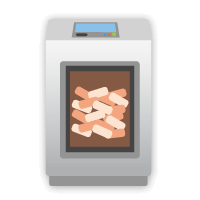
Biomass boilers burn wood pellets, chips, or logs to generate heat for your home.
Biomass boilers burn wood fuel (pellets, chips, logs) to heat water. This hot water warms your home through radiators and (in some models) provides hot tap water. The key is to keep the fire going (fuel hopper) and transfer the heat (heat exchanger) to the water circulating throughout your home. However, unlike gas boilers, they require more maintenance and rely on sustainable fuel sources.
Biomass boilers are highly efficient, with modern models achieving efficiency ratings of up to 90% or more. While they offer a renewable heating option, their popularity in the UK is modest compared to gas or electric boilers.
If you propose to install a biomass boiler in a Smoke Control Area, it is a legal requirement that you install an Exempted Appliance and burn only Authorised Fuels in that area.
The initial cost of biomass boilers can be significant, especially compared to conventional and combi boiler prices.
| England, Scotland, Wales | Northern Ireland | |
|---|---|---|
| Fuel costs (p/kWh) | 10.5 | 8.3 |
| Standing charge (£/year) | - | - |
| Carbon dioxide equivalent factor (kgCO2e/kWh) | 0.048 | 0.048 |
When you compare boiler prices in the UK, it's best if you do it with an experienced installer. They can help you with the new boiler price comparison based on your specific situation.
Household Quotes can connect you with the best installers in your location, whether you're looking for gas or combi boiler quotes. Get 3 free, non-binding quotes with just a click. Complete our short form by clicking the button below.
- Quotes from local installers
- Payment by finance available
- Save up to £975
It only takes 30 seconds

Compare boilers: Different brands
While the UK boasts many reliable boiler brands, choosing can be tricky. One homeowner might prioritise affordability over fancy features, while another focuses on finding an environmentally friendly and efficient boiler.
All basic boiler comparisons involve researching manufacturer reviews, boiler company awards, and endorsements to pick the best brand for your needs, whether it's a budget-friendly option or one known for innovation.
When comparing boilers from different brands, several key factors should be considered:
- Efficiency ratings: Most modern boilers have high efficiency ratings (typically over 90%), translating to lower energy ratings over time. For example, Viessmann Vitodens 100-W boilers boast efficiency ratings of up to 98%.
- Warranty periods: Longer warranties provide greater peace of mind and potential cost savings on repairs. Worcester Bosch and Viessmann offer up to 10 and 12-year warranties, respectively.
- Features and technology: Baxi boilers come with user-friendly interfaces and compact designs while Viessmann boilers are known for their innovative technology, including self-modulating capabilities for improved efficiency.
- Customer reviews and reliability: Worcester Bosch consistently receives high customer satisfaction ratings and is often considered one of the most reliable brands in the UK. Other highly-rated brands for reliability include Viessmann, Vaillant, and Ideal boilers.
- Environmental considerations: Viessmann offers boilers compatible with solar thermal systems, while Worcester Bosch is developing hydrogen-ready boilers for future sustainability. Also, some Vaillant boilers are 85% recyclable at the end of their lifespan.
Compare boiler prices in the UK
When shopping for a new boiler, it's crucial to do a proper boiler price comparison. This includes both the boiler itself and installation.
Researching different boilers allows you to weigh factors like energy efficiency, output size, warranties, and features. This empowers you to choose the perfect boiler for your needs and budget.
Boiler replacement typically costs between £2,000 and £6,250 (including installation). This variation is due to the boiler type, installation costs, fuel type, and brand.
Here are the typical costs to refer to when you compare new boiler prices:
| Combi boiler | System boiler | Conventional boiler | |
|---|---|---|---|
| Budget models | £2,000–£4,400 | £2,000–£4,400 | £2,000–£4,400 |
| Mid-range models | £2,000–£4,400 | £2,500–£4,800 | £2,500–£4,800 |
| Premium models | £2,600–£5,500 | £2,900–£5,500 | £2,900–£6,250 |
If you find boiler prices overwhelming, applying for boiler grants is a good option to significantly save on the new boiler cost. For example, with the Boiler Upgrade Scheme, you can get up to £7,500 to install a biomass boiler.
ECO4 is a UK government-backed initiative that aims to improve the energy efficiency of homes across the country. It specifically targets low-income households and those in fuel poverty. If you receive certain government benefits, you can get free or subsidised installations of loft insulation, cavity wall insulation, solid wall insulation (for specific situations), upgraded boilers (including some biomass models), and heat pumps.
A professional boiler installer can help you understand whether you're eligible for a boiler grant. Alternatively, they can help you compare boiler prices to find the one that suits your budget.
Next, it's advisable to compare boiler quotes from local engineers to make sure you don't overspend on installation. You can search for a boiler installer yourself, but how time-consuming would that be?
Thankfully, Household Quotes can make the new boiler quote comparison a breeze! We can connect you with up to 3 boiler installers we have thoroughly vetted. Simply answer a couple of questions in our 30-second form and receive free, non-binding quotes to choose from. Click below to begin.
- Quotes from local installers
- Payment by finance available
- Save up to £975
It only takes 30 seconds

Comparing boiler payback periods
When comparing boiler payback periods, several factors need to be considered, including the boiler's initial cost, installation costs, and annual savings on energy bills.
The payback period for a boiler is also influenced by its efficiency rating. The higher it is, the lower your payback period. Thankfully, as of April 2018, the new Boiler Standards require a minimum performance for domestic gas boilers in England of not lower than 92%.
So, here are the typical payback periods for different efficiency ratings:
| Old boiler rating | Annual savings | Payback period |
|---|---|---|
| D (78%-82%) | £215 | 7–22 years |
| E (74%-78%) | £260 | 6-18 years |
| F (70%-74%) | £330 | 5-14 years |
| G (70%) | £475 | 3-10 years |
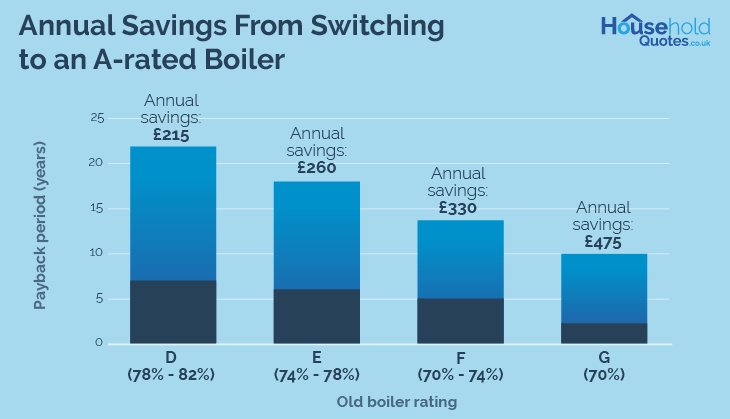
Compare boiler quotes: Find a boiler suited for you
New boiler comparison can feel like a daunting task. Sifting through technical jargon, researching different boiler types, and then hunting down reliable installers – it's enough to derail your entire heating project.
However, even if you know which boiler will suit your home, there's a catch. Most reputable installers can be booked up weeks in advance, leaving you in the cold (literally).
Their busy schedules often mean hours spent searching online reviews and comparing quotes. This can easily turn into another exhausting chore on your list.
Thankfully, with Household Quotes, you can avoid lengthy searches. Fill in our 30-second form to receive up to 3 quotes from reputable installers near you. Once you get your boiler quotes, compare them to choose the one that fits your budget best. It's free and non-binding. Click below to get started.
FAQ
Worcester Bosch is highly regarded for its high-quality, energy-efficient boilers. They offer a comprehensive range of gas and oil-fired boilers, including combi, system, and regular boilers, with warranties of up to 10 years.
The Ideal Logic Max Combi 24kW gas boiler is considered one of the cheapest boilers to run. It has a 94% efficiency rating and costs around £1,049.
The average cost to replace a boiler ranges between £2,000 and £6,250. Compare boiler quotes from multiple installers to get the best price.
The Viessmann Vitodens 100-W is often cited as the most reliable combi boiler and one of the best boilers in the UK. It costs around £1,400 so if you need a cheaper combi boiler, compare combi boiler prices from the more affordable brands.
